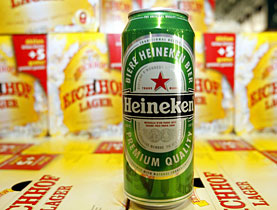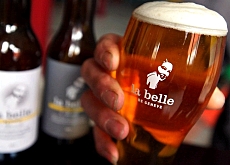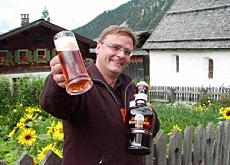Heineken deal for Eichhof brews mixed feelings

The Swiss beer industry has shown mixed reaction to the news that Dutch beer giant Heineken plans to acquire the Lucerne-based Eichhof brewery.
Some in the industry view the takeover bid for Switzerland’s last major independent brewer as an opportunity, while others have regretted the move.
Heineken offered last week to pay SFr278.5 million ($275.5 million) for the drinks business belonging to Eichhof Holding, of which Eichhof beer is its flagship brand.
If the transaction is completed in the third quarter as planned, the Dutch brewer would consolidate its number two position on the Swiss drinks market, with 23 per cent of market share, behind Denmark’s Carlsberg, owner of the Feldschlösschen group, which has 40 per cent. No job cuts have been announced.
Eichhof’s board says it is convinced that Heineken’s offer exceeds the “achievable potential” of Eichhof Beverages on a stand-alone basis.
The Swiss Brewers’ Association, which represents 99 per cent of breweries in Switzerland, including Carlsberg and Heineken, said the transaction was a natural development.
“Throughout the world we have a time of fusions everywhere,” association director Konrad Studerus told swissinfo.
“It’s because of the economy of scale; if you have bigger breweries which produce more beer, then of course you can produce it cheaper.”
Fizzing reactions
However, some Swiss newspapers and smaller industry members have bemoaned the fact that the last of the larger independent breweries – it had an eight per cent market share – has ended up in foreign hands.
St Gallen’s Schützengarten is now the biggest independent brewery. In addition, there are hundreds of smaller brewers, which account for 18 per cent of the market, with 19 per cent covered by imported beers.
An organisation that represents Swiss small and medium-sized independent brewers said in a statement after the deal was announced that it regretted “the disappearance of another very traditional Swiss brewery” and that it expected more jobs to be lost in the mid-term.
“We hope that the concentration process in the Swiss beer industry has therefore finished and this exasperating cut-throat competition will come to an end,” it commented.
“Consumers want and expect a variety in beers and this is only possible by having many independent breweries,” it added.
Glass half-full
But Studerus sees the deal as positive. “It is in fact a chance for Eichhof because Eichhof has a very good reputation and is situated in the heart of Switzerland. From here you can deliver across the country,” he explained.
It may well produce special beers for the Dutch company, he said, which would be good for the firm. For him, the 170-year-old tradition of Eichhof beer is not in danger of losing its identity.
“The brand Eichhof will exist for a very long time because it’s in the mind and heart of consumers; it’s a strong brand,” Studerus said.
He expects competition between Carlsberg and Heineken to intensify, but noted that smaller breweries could offer themselves as an alternative by promoting their regional brands.
“I have heard from different smaller breweries that they are not angry or anxious became of this fusion; they see it more of a chance,” he added.
Although Heineken has targeted Switzerland, the Swiss are not huge beer drinkers. The per capita consumption is 57 litres per year – below the European average. It is far lower than neighbouring Germany (110 litres per capita), but still higher than that of France or Italy.
“Switzerland is a half beer, half wine country and especially in the western part, around Geneva and Lausanne, people prefer wine to beer,” Studerus said.
“In the western part, people drink on average about half the amount of beer than in the eastern areas.”
swissinfo, Isobel Leybold-Johnson
Heineken has offered to pay SFr278.5 million ($275.5 million) and take on SFr11.5 million in debt in the Eichhof deal. It already has Heinken, Amstel, Calanda, Haldengut, Ittinger Klosterbräu and several speciality beers in its Swiss portfolio.
Eichhof’s board has recommended shareholders to approve the transaction, which puts a 45 per cent premium on the division’s estimated value.
Heineken intends to launch the offer on May 7, and expects the acquisition to close in the third quarter. Eichhof’s shareholders are due to vote on the takeover on June 18.
Besides selling off its main source of revenue, Lucerne-based Eichhof plans to spin off its Datacolor colour measuring division and sell off its property holdings.
The Swiss beer industry is worth around SFr1 billion ($1 billion).
Around 4.4 million hectolitres of beer was consumed in 2007 in Switzerland.
Annual consumption per capita: 57 litres (same as Sweden, lower than Germany, higher than Italy and France).
Lager is the most popular beer (around 78 per cent market share).
Source: Swiss Brewers’ Association

In compliance with the JTI standards
More: SWI swissinfo.ch certified by the Journalism Trust Initiative



You can find an overview of ongoing debates with our journalists here. Please join us!
If you want to start a conversation about a topic raised in this article or want to report factual errors, email us at english@swissinfo.ch.